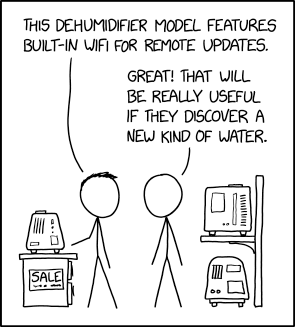xkcd #3109: Dehumidifier
xkcd #3109: Dehumidifier
Title text:
It's important for devices to have internet connectivity so the manufacturer can patch remote exploits.
Transcript:
[A store salesman, Hairy, is showing Cueball a dehumidifier, with a "SALE" label on it. Several other unidentified devices, possibly other dehumidifier models, are shown in the store as well.]
Salesman: This dehumidifier model features built-in WiFi for remote updates.
Cueball: Great! That will be really useful if they discover a new kind of water.
Source: https://xkcd.com/3109/

welll........ devils advocate.. i could see the wifi being used so the device can be incorporated into the home automation system [climate control]. its not about dehumidifying, its solely about engaging the dehumidifying as needed.
Yeah, or the manufacturer bricks the device bcz they want to sell you a new one.
That's why projects like this are great: https://github.com/Hypfer/esp8266-midea-dehumidifier
My Midea Cube dehumidifier can never be bricked and will never send data outside of my home. It talks to Home Assistant via MQTT and nothing else.
Literally nobody is doing this shit.
Dehumidifiers already do that. They're equipped with hygrometers that kick the machine on or off depending on the relative humidity. It's old tech and it's pretty reliable, wifi isn't really necessary for it.
The built-in hygrometer's not necessarily going to be as good as a well-designed home automation system, especially if the fan's not running all the time, so it has to wait for damp air to diffuse into the machine. It also lets you do other things, like not bother turning the dehumidifier on if there are open windows if you've got some way to detect that, or report the humidity to something that will graph it. It's not stuff that most consumers will care about, but a microcontroller with WiFi like the ESP8266 or ESP32-C3 costs less than an accurate hygrometer chip, so it doesn't make much, if any, difference to the final price, particularly if the product was going to use a microcontroller anyway.
To steel-man the argument some more, if you have variable-rate electricity, it could turn on when electricity is cheap.
This can be done with something like Zigbee. Or even simpler: you hook a non-connected device up to a "smart" power socket. No need for the device itself to talk to the outside world.
You could do all that without internet connectivity, just sayin.
Because times when electricity is cheap coincide with the need for lowering humidity?
That's the feature they sell. But, its real purpose is to monetize your data and/or lock you into some sort of ridiculous subscription service and/or run ads.
That's pretty much ubiquitous for "smart" devices.
That's right, this would mean that the device has an api to activate or deactivate it through WiFi by sending it commands and I can make it unable to connect to the outside internet right?
Or I can only activate it with the proprietary app that doesn't even have a working schedule?
Connecting to WiFi is good when I have full control but not when the manufacturer does
Yeah, devices that can run fully local are the best. They can be integrated into Home Assistant (or similar), with full control over them. No reliance on a remote server or proprietary app.
Johnson. You're hired!
Dehumidifiers aren’t there to make your house more comfortable though, they are there to keep (usually basements or garages) from growing mold. In fact they usually heat up the space they’re in. So unless you want to have a log of humidity, there’s stop no reason to automate it over WiFi, since the humidity setting on the unit is automatic.
As others have said, an alert if the tank is full would be legitimately useful, for a model that doesn't have a drain line.
dont be dictatatin' my humidity comfort level.
Better solution: smart plug